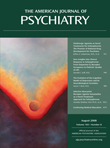To the Editor: The editorial
(1) commenting on the recent study of rapid cycling by Dr. Schneck et al. emphasized the causal effects of antidepressant use, although the article itself cautioned against making causal inferences. In the article, no discernible relationship between antidepressant
use and the number of prospectively observed episodes was reported in Table 3. However, among subjects who were
not prescribed antidepressants, most of these subjects had no subsequent depressive episodes, while fewer had one episode, two to three episodes, or four episodes. The significant overall association was driven by the rarity of episodes among patients who were not taking antidepressants or the rarity of antidepressants among patients who had few depressive episodes. More telling clues might have come from examining the incidence of prospective episodes, stratified by antidepressant use, solely among the 356 subjects who experienced rapid cycling during the preceding year.
Dr. Ghaemi’s editorial contrasts the higher prevalence rate of the subjects’ retrospectively identified rapid cycling during the year before they entered the Systematic Treatment Enhancement Program for Bipolar Disorder (STEP-BD) with a low prospective incidence, attributing the reduction to either “appropriate treatment in STEP-BD or…natural history” (
1, p. 300). Another plausible explanation is that retrospective and prospective assessments of rapid cycling are not comparable methodologically. As a co-author of the original retrospective STEP-BD rapid cycling study, I will reiterate the caveat that interepisode recovery was not verifiable (in the original study) between alleged recurrences, making it hard to differentiate incomplete remissions with a waxing and waning course from multiple truly new episodes. Retrospective rates also may have been inflated by impressionistic recall or lay confusion between true rapid cycling versus mood lability without associated syndromic criteria.
Moreover, the prospective study conducted by Schneck et al. did not discriminate cycling patterns for subjects who were taking antidepressants during the pre-enrollment year and discontinued these medications, continued to take these medications, or began taking these medications anew after the enrollment year. STEP-BD physicians may have avoided antidepressants or simply did not see the need to use them when episodes were infrequent, making antidepressant use a result rather than cause of multiple episodes. Dr. Ghaemi, with co-authors Soldani, Tondo, Akiskal, and Goodwin
(2), rightly levied this same critique (“confounding by indication”) against an earlier nonrandomized study that sought to interpret long-term antidepressant use as the cause (rather than result) of few relapses.
It is likely that antidepressants are neither all good nor all bad. STEP-BD has taught us that broad generalizations regarding the use of antidepressants are relatively uninformative. Much as antibiotics or antineoplastics exert different effects in different subgroups, so too are antidepressants likely to be safe and effective in a definable bipolar subtype—most likely bipolar II depressed patients with no mixed features, no recent mania, no prior antidepressant-associated mania, and no comorbid substance abuse
(3) . Far from being the nail in any coffin, the heterogeneity of antidepressant outcomes demands further controlled trials to discern more sophisticated profiles for guiding treatment decisions.

